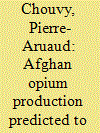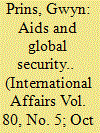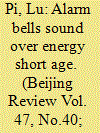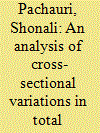| Srl | Item |
| 1 |
ID:
059890


|
|
|
| 2 |
ID:
057635


|
|
|
| 3 |
ID:
054050


|
|
|
| 4 |
ID:
064660


|
|
|
| 5 |
ID:
059976


|
|
|
| 6 |
ID:
053915


|
|
|
| 7 |
ID:
052298


|
|
|
|
|
| Publication |
Oct 2004.
|
| Summary/Abstract |
Using micro level household survey data from India, we analyse the variation in the pattern and quantum of household energy requirements, both direct and indirect, and the factors causing such variation. An econometric analysis using household survey data from India for the year 1993–1994 reveals that household socio-economic, demographic, geographic, family and dwelling attributes influence the total household energy requirements. There are also large variations in the pattern of energy requirements across households belonging to different expenditure classes. Results from the econometric estimation show that total household expenditure or income level is the most important explanatory variable causing variation in energy requirements across households. In addition, the size of the household dwelling and the age of the head of the household are related to higher household energy requirements. In contrast, the number of members in the household and literacy of the head are associated with lower household energy requirements.
|
|
|
|
|
|
|
|
|
|
|
|
|
|
|
|
| 8 |
ID:
059887


|
|
|
| 9 |
ID:
057599


|
|
|
| 10 |
ID:
059892


|
|
|
| 11 |
ID:
059886


|
|
|
| 12 |
ID:
054077


|
|
|
| 13 |
ID:
058044


|
|
|
| 14 |
ID:
052297


|
|
|
|
|
| Publication |
Oct 2004.
|
| Summary/Abstract |
The use of biomass in Finland and Sweden has steadily increased over the past 25 years, up to approximately 20% of the primary energy supply in 2001. In both countries most biomass originates from forests. Forest biomass is now an integral part of modern energy systems, although primarily in industry and in the heating sector. For example, biomass accounts for 7.9% and 53% of the fuel mix in district heating in Finland and Sweden, respectively.
The general energy policy of both countries has supported biomass for energy over the entire period, although specific policies have changed with time. Research, development and demonstration has been continuously supported, and some subsidy schemes have been applied, in particular, for district heating systems (DHS) and combined heat and power. Heavy taxation of competing fossil fuels seems to have been the most effective policy instrument, although this has been directed mainly at the heat and transportation fuel markets. Electricity taxes are imposed on consumption (industry is largely exempt), and do not discriminate significantly between the sources of electricity. Starting in 2003, Sweden will have a quota-based system, a renewable portfolio standard, which is expected to increase biomass-based electricity production.
Both countries possess vast and not fully exploited biomass resources in the form of forests, and have a history of rational and large-scale forestry. Strong actors exist both with regard to forest ownership and the industrial processing of forest products. The user side, in particular, represented by DHS, can also be characterised by strong and professional management. Over time, structures have developed that facilitate an increased use of biomass for energy, for example, the forest industry infrastructure and extensive district heating. Actors within these structures have had the ability to react to policies, resulting in a stable growth in biomass use.
|
|
|
|
|
|
|
|
|
|
|
|
|
|
|
|
| 15 |
ID:
057631


|
|
|
| 16 |
ID:
054166


|
|
|
| 17 |
ID:
059973


|
|
|
| 18 |
ID:
057629


|
|
|
| 19 |
ID:
057603


|
|
|
| 20 |
ID:
058043


|
|
|